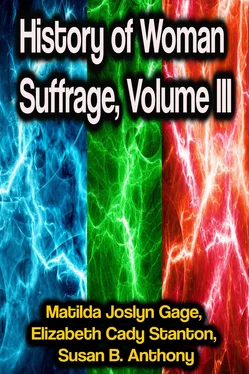The President pro tempore : The senator from Massachusetts calls it up as a matter of right. If a majority of the Senate agree to take up the resolution it is before the Senate, and the Chair will put the question. The question is on agreeing to the motion of the senator from Massachusetts to proceed to the consideration of the resolution. [The motion was agreed to; and the Senate resumed the consideration of the resolution reported from the Committee on Rules by Mr. Hoar on the 13th instant, which was read.]
The President pro tempore : The pending question is on the motion of the senator from Delaware [Mr. Bayard] to refer the subject to the Committee on the Judiciary, on which the yeas and nays have been ordered.
Mr. Morgan: Mr. President, I stand in a different relation to this question from that of the senator from Kentucky [Mr. Beck], who said yesterday that he had received a number of communications from very respectable ladies in his own State upon this very important subject, and yet felt constrained by a sense of duty to deny the action which they solicited at the hands of congress. I am not informed that any woman from Alabama has ever sent a petition to the Senate, or to either house, upon this matter. Indeed, it is my impression that no petitions or letters have ever been addressed by any lady in the State of Alabama to either house of congress upon this question. It may be that that peculiar type of civilization which drives women from their homes to the ballot-box to seek redress and protection against their husbands has never yet reached the State of Alabama, and I shall not be disagreeably disappointed if it should never come upon our people, for they have lived in harmony and in prosperity now for many years. Besides the relief which the State has seen proper to give to married women in respect of their separate estates, we have not thought it wise or politic in any sense to go further and undertake to make a line of demarkation between the husband and wife as politicians. On the contrary, according to our estimate of a proper civilization, we look to the family relation as being the true foundation of our republican institutions. Strike out the family relation, disband the family, destroy the proper authority of the person at the head of the family, either the wife or the husband, and you take from popular government all legitimate foundation.
The measure which is now brought before the Senate of the United States is but the initial measure of a series which has been urged upon the attention of States and territories, and upon the attention of the Congress of the United States in various forms to draw a line of political demarkation through a man's household, through his fireside, and to open to the intrusion of politics and politicians that sacred circle of the family where no man should be permitted to intrude without the consent of both the heads of the family. What picture could be more disagreeable or more disgusting than to have a pot-house politician introduce himself into a gentleman's family, with his wife seated at one side of the fireplace and himself at the other, and this man coming between to urge arguments why the wife should oppose the policy that the husband advocates, or that the husband should oppose the policy that the wife advocates?
If this measure means anything it is a proposition that the Senate of the United States shall first vote to carry into effect this unjust and improper intrusion into the home circle. Suppose this resolution to raise a select committee should be passed: that committee will have its hands full and its ears full of petitions and applications and speeches from strong-minded women, and of course it must make some report to the Senate; and we shall have this subject introduced in here as one that requires a peculiar application of the powers of the Senate for its digestion and for the completion of the bills and measures founded upon it. At the next session of congress this select committee will become a standing committee of the Senate, and then we shall have that which appears to be the most potential and at the same time the most dangerous element in politics to-day, agitation, agitation, agitation. It seems that the legislators of the United States Government are not to be allowed to pass in quiet judgment upon measures of this character, but like many other things which are addressing themselves to the attention of the people on this side of the water and the other, they must all be moved against the Senate and against the House by agitation. You raise your committee and allow the agitators to come before them, yea, more than that, you invite them to come; and what is the result? The Congress of the United States will for the next ten or perhaps twenty years be continually assailed for special and peculiar legislation in favor of the women of the land.
I do not understand that a woman in this country has any more right to a select committee than a man has. It would be just as rational and as proper in every legislative and parliamentary sense to have a select committee for the consideration of the rights of men as to have a committee for the consideration of the rights of women. I object, sir, to this disseverance between the sexes, and I object to the Senate of the United States giving its sanction in advance or in any way to this character of legislation. It is a false principle, and it will work evil, and only evil, in this country.
What jurisdiction do you expect to exercise in the Senate of the United States for the benefit of the women in respect of suffrage or in respect of separate estates? Where are the boundaries of your jurisdiction? You find them in the territories and in the District of Columbia. If you expect to proceed into the States you must have the Constitution of the United States amended so as to put our wives and our daughters upon the footing of those who are provided for in the fourteenth and fifteenth amendments. Your jurisdiction is limited to the territories and to the District of Columbia.
Inasmuch as this measure, I understand, has been made a party measure by the decree of a caucus, I propose to make some little inquiry into the past legislation of the Congress of the United States under Republican rule in respect of the extension of the right of suffrage to certain classes of people in this country. I will take up first the territories.
Let us look for a moment at the result of woman suffrage in some of the territories. The territorial legislature of Utah has gone forward and conferred the right of suffrage upon women. The population in the last decade has reached from 64,000, I believe, to about 150,000. The territorial legislature of Utah conferred upon the females of that territory the right of suffrage, and how have they exercised that right? Sir, I am ashamed to say it, but it is known to the world that the power of Mormonism and polygamy in Utah territory is sustained by female suffrage. You cannot get rid of those laws. Ninety per cent. of the legislative power of Utah territory is Mormon and polygamous. If female suffrage is to be incorporated into the laws of our country with a view to the amelioration of our morals or our political sentiments, we stand aghast at the spectacle of what has been wrought by its exercise in the territory of Utah. There stands a power supporting the crime of polygamy through what they call a divine inspiration, or teaching from God, and all the power of the judges of the United States and of the Congress of the United States has been unavailing to break it down. Who have upheld it? Those who in the family circle represent one husband to fifteen women. A continual accumulation of the power of the church and of polygamy is going on, and when the Gentiles, as they are called, enter that territory with the view of breaking it up they are confronted by the women, who are allowed to vote, and from whom we should naturally expect a better and a higher morality in reference to subjects of the kind. But this only shows the power of man over woman. It only shows how through her tender affections, her delicate sensibilities, and her confiding spirit she can be made the very slave and bond-servant of man, and can scarcely ever be made an independent participant in the stronger exercise of the powers which God seems to have intrusted to him. Never was there a picture more disgusting or more condemnatory of the extension of the franchise to women as contradistinguished from men than is presented in the territory of Utah to-day.
Читать дальше












